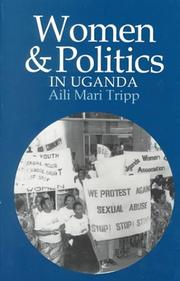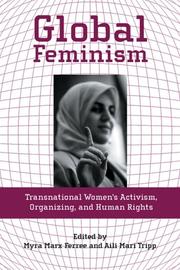| Listing 1 - 10 of 10 |
Sort by
|
Book
ISBN: 9781588267313 9781588267078 1588267075 1588267318 1685856934 Year: 2010 Publisher: Boulder, Colo. Rienner
Abstract | Keywords | Export | Availability | Bookmark
 Loading...
Loading...Choose an application
- Reference Manager
- EndNote
- RefWorks (Direct export to RefWorks)
Government --- Internal politics --- Museveni, Yoweri Kaguta --- Uganda --- Museveni, Yoweri, --- Ouganda --- Politics and government --- Politique et gouvernement

ISBN: 0520202783 0520202791 0585054355 9780585054353 9780520202795 Year: 1997 Publisher: Berkeley: University of California press,
Abstract | Keywords | Export | Availability | Bookmark
 Loading...
Loading...Choose an application
- Reference Manager
- EndNote
- RefWorks (Direct export to RefWorks)
Business cycles --- Tanzania --- Informal sector (Economics) --- Government, Resistance to --- Business & Economics --- Economic History --- Dar es Salaam (Tanzania) --- Economic conditions. --- Economic policy. --- #SBIB:39A73 --- #SBIB:39A4 --- #SBIB:327.4H60 --- Etnografie: Afrika --- Toegepaste antropologie --- Derde wereld: ontwikkeling, sociale verandering: algemeen --- Civil resistance --- Non-resistance to government --- Resistance to government --- Hidden economy --- Parallel economy --- Second economy --- Shadow economy --- Subterranean economy --- Underground economy --- Artisans --- Economics --- Small business --- Political science --- Political violence --- Insurgency --- Nonviolence --- Revolutions --- City of Dar es Salaam (Tanzania) --- Dār es Salām (Tanzania) --- Daressalaam (Tanzania) --- دار السلام (Tanzania) --- Dār al-Salām (Tanzania) --- Dar äs Salam (Tanzania) --- Горад Дар-эс-Салам (Tanzania) --- Horad Dar-ės-Salam (Tanzania) --- Дар-эс-Салам (Tanzania) --- Дар ес-Салаам (Tanzania) --- Daressalam (Tanzania) --- Νταρ ες Σαλάμ (Tanzania) --- Daresalamo (Tanzania) --- Dárasalám (Tanzania) --- דאר א-סלאם (Tanzania) --- Dar a-Salam (Tanzania) --- Дар-эс-Салам шаары (Tanzania) --- Dar-ės-Salam shaary (Tanzania) --- Dāresalāma (Tanzania) --- Dar es Salamas (Tanzania) --- Дар ес Салам (Tanzania) --- ダルエスサラーム (Tanzania) --- Daruesusarāmu (Tanzania) --- Dar es Salaam --- Economic conditions --- Economic policy --- Civil disobedience --- Informal sector (Economics) - Tanzania - Dar es Salaam. --- Government, Resistance to - Tanzania. --- Political resistance
Book
ISBN: 9780521879309 9780521704908 0521879302 0521704901 9780511800351 9780511480690 0511480695 9780511479014 0511479018 0511479891 9780511479892 9780511474248 0511474245 1282001558 9781282001558 0511800355 1107199336 9786612001550 051147749X 0511476043 9780511477492 Year: 2009 Publisher: Cambridge ; New York : Cambridge University Press,
Abstract | Keywords | Export | Availability | Bookmark
 Loading...
Loading...Choose an application
- Reference Manager
- EndNote
- RefWorks (Direct export to RefWorks)
Women entered the political scene in Africa after the 1990s, claiming more than one third of the parliamentary seats in countries like Mozambique, South Africa, Tanzania, Uganda, and Burundi. Women in Rwanda hold the highest percentage of legislative seats in the world. Women's movements lobbied for constitutional reforms and new legislation to expand women's rights. This book examines the convergence of factors behind these dramatic developments, including the emergence of autonomous women's movements, changes in international and regional norms regarding women's rights and representation, the availability of new resources to advance women's status, and the end of civil conflict. The book focuses on the cases of Cameroon, Uganda, and Mozambique, situating these countries in the broader African context. The authors provide a fascinating analysis of the way in which women are transforming the political landscape in Africa.
Feminism --- Women's rights --- Women --- Féminisme --- Femmes --- Political activity. --- Droits --- Activité politique --- Women in politics. --- Féminisme --- Activité politique --- Feminism. --- Human females --- Wimmin --- Woman --- Womon --- Womyn --- Females --- Human beings --- Femininity --- Emancipation of women --- Feminist movement --- Women's lib --- Women's liberation --- Women's liberation movement --- Women's movement --- Social movements --- Anti-feminism --- Political activity --- Emancipation --- Social Sciences --- Political Science

ISBN: 9780299164836 0299164837 0299164845 9780299164843 0299164802 9780299164805 0852558392 9780852558393 0852558333 9780852558331 9970021982 9789970021987 Year: 2000 Publisher: Madison, Wis. : University of Wisconsin Press,
Abstract | Keywords | Export | Availability | Bookmark
 Loading...
Loading...Choose an application
- Reference Manager
- EndNote
- RefWorks (Direct export to RefWorks)
Women --- Feminism --- Femmes en politique --- Féminisme --- Femmes --- SOCIAL SCIENCE --- Feminism. --- Vrouwenbeweging. --- Politieke activiteit. --- Politikerin. --- Politische Betätigung. --- Frau. --- Political activity --- Societies and clubs. --- Associations. --- Feminism & Feminist Theory. --- Political activity. --- Uganda. --- Politische betätigung. --- Social science --- Feminism & feminist theory. --- Associations --- Societies and clubs --- Human females --- Wimmin --- Woman --- Womon --- Womyn --- Emancipation of women --- Feminist movement --- Women's lib --- Women's liberation --- Women's liberation movement --- Women's movement --- Emancipation --- Females --- Human beings --- Femininity --- Social movements --- Anti-feminism --- Women in politics in Uganda. --- Feminism in Uganda. --- African. --- Women in politics
Book
ISBN: 1108348629 1108628249 1108601847 110842564X 1108442846 Year: 2019 Publisher: Cambridge, England : Cambridge University Press,
Abstract | Keywords | Export | Availability | Bookmark
 Loading...
Loading...Choose an application
- Reference Manager
- EndNote
- RefWorks (Direct export to RefWorks)
Aili Mari Tripp explains why autocratic leaders in Morocco, Tunisia and Algeria embraced more extensive legal reforms of women's rights than their Middle Eastern counterparts. The study challenges existing accounts that rely primarily on religiosity to explain the adoption of women's rights in Muslim-majority countries. Based on extensive fieldwork in Morocco, Algeria and Tunisia and an original database of gender-based reforms in the Middle East and North Africa, this accessible study analyzes how women's rights are used both instrumentally and symbolically to advance the political goals of authoritarian regimes as leverage in attempts to side-line religious extremists. It shows how Islamist political parties have been forced to dramatically change their positions on women's rights to ensure political survival. In an original contribution to the study of women's rights in the Middle East and North Africa, Tripp reveals how women's rights movements have capitalized on moments of political turmoil to defend and advance their cause.
Women's rights --- Rights of women --- Women --- Human rights --- Civil rights --- Law and legislation --- Legal status, laws, etc. --- Women's rights.
Book
ISBN: 1316435334 1316336018 1316430367 1107115574 1107535875 Year: 2015 Publisher: New York, NY : Cambridge University Press,
Abstract | Keywords | Export | Availability | Bookmark
 Loading...
Loading...Choose an application
- Reference Manager
- EndNote
- RefWorks (Direct export to RefWorks)
The book explains an unexpected consequence of the decrease in conflict in Africa after the 1990s. Analysis of cross-national data and in-depth comparisons of case studies of Uganda, Liberia and Angola show that post-conflict countries have significantly higher rates of women's political representation in legislatures and government compared with countries that have not undergone major conflict. They have also passed more legislative reforms and made more constitutional changes relating to women's rights. The study explains how and why these patterns emerged, tying these outcomes to the conjuncture of the rise of women's movements, changes in international women's rights norms and, most importantly, gender disruptions that occur during war. This book will help scholars, students, women's rights activists, international donors, policy makers, non-governmental organizations (NGOs) and others better understand some of the circumstances that are most conducive to women's rights reform today and why.
Women --- Women's rights --- Gender Studies & Sexuality --- Gender & Ethnic Studies --- Social Sciences --- Human females --- Wimmin --- Woman --- Womon --- Womyn --- Females --- Human beings --- Femininity --- Rights of women --- Human rights --- Political activity --- Civil rights --- Law and legislation --- Legal status, laws, etc. --- Africa --- Eastern Hemisphere --- Politics and government

ISBN: 0814727352 0814727360 9780814727355 9780814727362 0814727948 1479861758 Year: 2006 Publisher: New York NYU Press
Abstract | Keywords | Export | Availability | Bookmark
 Loading...
Loading...Choose an application
- Reference Manager
- EndNote
- RefWorks (Direct export to RefWorks)
This important study is pitched to an academic community that remains highly patriarchal. Thus, it should make a valuable impact on this audience. -Choice: Highly reccomended." Global Feminism is an extremely useful and important volume that systematically examines transnational women's movements as well as raises a number of important theoretical questions about global rights and transnational organizing." -Amrita Basu, editor of 'The Challenge of Local Feminism: Women's Movements in Global Perspective'" Global Feminism offers a powerful analysis of the intersection of feminism and globalization, national women's movements and transnational politics, and activism and scholarship. Many of the authors reflect on their experiences as activists to produce a rich examination of feminist mobilization in the 21st century. Among the many strengths of this collection are the ways in which the authors make visible the contradictions of globalization for women's empowerment and evaluate feminist strategies for challenging male domination in its many forms. This book advances our understanding of how to increase social justice and democratic practice in movement organizations and feminist networks. The authors vividly demonstrate what feminism has to offer all movements for social justice." -Nancy A. Naples, author of 'Feminism and Method: Ethnography, Discourse Analysis and Activist Research'Increasingly feminists around the world have successfully campaigned for recognition of women's full personhood and empowerment. Global Feminism explores the social and political developments that have energized this movement. Drawn from an international group of scholars and activists, the authors of these original essays assess both the opportunities that transnationalism has created and the tensions it has inadvertently fostered. By focusing on both the local and global struggles of today's feminist activists this important volume reveals much about women's changing rights, treatme
Feminism --- Feminism. --- Transnationalism. --- International cooperation.
Book
ISBN: 1847012825 1800102712 9781800102705 1800102704 1847012817 9781847012814 Year: 2021 Publisher: Woodbridge, Suffolk ; Rochester, New York : James Currey,
Abstract | Keywords | Export | Availability | Bookmark
 Loading...
Loading...Choose an application
- Reference Manager
- EndNote
- RefWorks (Direct export to RefWorks)
Even in the best of circumstances, women are all too often excluded from formal peacemaking and peacebuilding processes and relegated to the sidelines as observers or limited to informal peacebuilding strategies. Yet there is enormous potential in these strategies as women often strive to build bridges across political, ethnic, religious, clan and other differences through alliances arising from common concerns around violence, land, access to resources, and protection of their families and communities, and address sources of conflict at both national and local levels. Drawing on cutting-edge research by scholars and women's rights activists in South Sudan, Sudan, Algeria, northern Nigeria, and Somalia, this book focuses on the consequences of the continuing exclusions of women from peace talks and from post-conflict governance structures. The case studies reveal how peacebuilding is gendered and why this matters in developing meaningful and sustainable approaches to peacebuilding. Examining how women activists have made a difference through informal peacebuilding activities, the contributors explore women's efforts to reshapethe post-conflict context by struggling for legislative and constitutional reforms and by advocating for political representation and political inclusion more generally within peacebuilding processes. They also look at how women have pushed back against the conservative Islamist forces that today dominate much armed conflict in Africa. Suggesting that women's formal participation in peace negotiations is vital in bringing about an end to conflict and preventing its resumption, as well as the one of the most effective strategies, this book will be essential reading for scholars and NGOs involved in development, conflict resolution and peacebuilding.
Women in peace-building --- Peace-building --- Africa. --- Eastern Hemisphere
Book
ISBN: 0814770134 9780814770139 9780814770207 0814770207 9780814760345 0814760341 Year: 2013 Publisher: New York, NY
Abstract | Keywords | Export | Availability | Bookmark
 Loading...
Loading...Choose an application
- Reference Manager
- EndNote
- RefWorks (Direct export to RefWorks)
The nature of human security is changing globally: interstate conflict and even intrastate conflict may be diminishing worldwide, yet threats to individuals and communities persist. Large-scale violence by formal and informal armed forces intersects with interpersonal and domestic forms of violence in mutually reinforcing ways. Gender, Violence, and Human Security takes a critical look at notions of human security and violence through a feminist lens, drawing on both theoretical perspectives and empirical examinations through case studies from a variety of contexts around the globe.This fascinating volume goes beyond existing feminist international relations engagements with security studies to identify not only limitations of the human security approach, but also possible synergies between feminist and human security approaches. Noted scholars Aili Mari Tripp, Myra Marx Ferree, and Christina Ewig, along with their distinguished group of contributors, analyze specific case studies from around the globe, ranging from post-conflict security in Croatia to the relationship between state policy and gender-based crime in the United States. Shifting the focus of the term “human security” from its defensive emphasis to a more proactive notion of peace, the book ultimately calls for addressing the structural issues that give rise to violence. A hard-hitting critique of the ways in which global inequalities are often overlooked by human security theorists, Gender, Violence, and Human Security presents a much-needed intervention into the study of power relations throughout the world.
Human security. --- Feminist theory. --- Women --- SOCIAL SCIENCE / Women's Studies. --- SOCIAL SCIENCE / Sociology / General. --- POLITICAL SCIENCE / General. --- Non-traditional security (Human security) --- NTS (Human security) --- Security, Human --- Human rights --- Feminism --- Feminist philosophy --- Feminist sociology --- Theory of feminism --- Human females --- Wimmin --- Woman --- Womon --- Womyn --- Females --- Human beings --- Femininity --- Violence against. --- Philosophy --- Women Violence against --- Violence against
Book

ISBN: 0299236633 0299236641 1282697463 9786612697463 Year: 2010 Publisher: University of Wisconsin Press
Abstract | Keywords | Export | Availability | Bookmark
 Loading...
Loading...Choose an application
- Reference Manager
- EndNote
- RefWorks (Direct export to RefWorks)
| Listing 1 - 10 of 10 |
Sort by
|

 Search
Search Feedback
Feedback About UniCat
About UniCat  Help
Help News
News